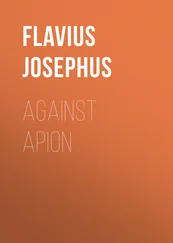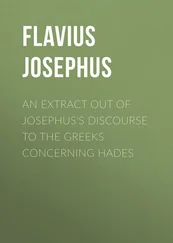Flavius Josephus - Antiquities of the Jews
Здесь есть возможность читать онлайн «Flavius Josephus - Antiquities of the Jews» — ознакомительный отрывок электронной книги совершенно бесплатно, а после прочтения отрывка купить полную версию. В некоторых случаях можно слушать аудио, скачать через торрент в формате fb2 и присутствует краткое содержание. Жанр: foreign_prose, История, foreign_edu, foreign_antique, на английском языке. Описание произведения, (предисловие) а так же отзывы посетителей доступны на портале библиотеки ЛибКат.
- Название:Antiquities of the Jews
- Автор:
- Жанр:
- Год:неизвестен
- ISBN:нет данных
- Рейтинг книги:5 / 5. Голосов: 1
-
Избранное:Добавить в избранное
- Отзывы:
-
Ваша оценка:
- 100
- 1
- 2
- 3
- 4
- 5
Antiquities of the Jews: краткое содержание, описание и аннотация
Предлагаем к чтению аннотацию, описание, краткое содержание или предисловие (зависит от того, что написал сам автор книги «Antiquities of the Jews»). Если вы не нашли необходимую информацию о книге — напишите в комментариях, мы постараемся отыскать её.
Antiquities of the Jews — читать онлайн ознакомительный отрывок
Ниже представлен текст книги, разбитый по страницам. Система сохранения места последней прочитанной страницы, позволяет с удобством читать онлайн бесплатно книгу «Antiquities of the Jews», без необходимости каждый раз заново искать на чём Вы остановились. Поставьте закладку, и сможете в любой момент перейти на страницу, на которой закончили чтение.
Интервал:
Закладка:
3. Now while Joshua, the commander, was in fear about their passing over Jordan, for the river ran with a strong current, and could not be passed over with bridges, for there never had been bridges laid over it hitherto; and while he suspected, that if he should attempt to make a bridge, that their enemies would not afford him thee to perfect it, and for ferry-boats they had none,-God promised so to dispose of the river, that they might pass over it, and that by taking away the main part of its waters. So Joshua, after two days, caused the army and the whole multitude to pass over in the manner following:—The priests went first of all, having the ark with them; then went the Levites bearing the tabernacle and the vessels which belonged to the sacrifices; after which the entire multitude followed, according to their tribes, having their children and their wives in the midst of them, as being afraid for them, lest they should be borne away by the stream. But as soon as the priests had entered the river first, it appeared fordable, the depth of the water being restrained and the sand appearing at the bottom, because the current was neither so strong nor so swift as to carry it away by its force; so they all passed over the river without fear, finding it to be in the very same state as God had foretold he would put it in; but the priests stood still in the midst of the river till the multitude should be passed over, and should get to the shore in safety; and when all were gone over, the priests came out also, and permitted the current to run freely as it used to do before. Accordingly the river, as soon as the Hebrews were come out of it, arose again presently, and came to its own proper magnitude as before.
4. So the Hebrews went on farther fifty furlongs, and pitched their camp at the distance of ten furlongs from Jericho; but Joshua built an altar of those stones which all the heads of the tribes, at the command of the prophets, had taken out of the deep, to be afterwards a memorial of the division of the stream of this river, and upon it offered sacrifice to God; and in that place celebrated the passover, and had great plenty of all the things which they wanted hitherto; for they reaped the corn of the Canaanites, which was now ripe, and took other things as prey; for then it was that their former food, which was manna, and of which they had eaten forty years, failed them.
5. Now while the Israelites did this, and the Canaanites did not attack them, but kept themselves quiet within their own walls, Joshua resolved to besiege them; so on the first day of the feast [of the passover], the priests carried the ark round about, with some part of the armed men to be a guard to it. These priests went forward, blowing with their seven trumpets; and exhorted the army to be of good courage, and went round about the city, with the senate following them; and when the priests had only blown with the trumpets, for they did nothing more at all, they returned to the camp. And when they had done this for six days, on the seventh Joshua gathered the armed men and all the people together, and told them these good tidings, That the city should now be taken, since God would on that day give it them, by the falling down of the walls, and this of their own accord, and without their labor. However, he charged them to kill every one they should take, and not to abstain from the slaughter of their enemies, either for weariness or for pity, and not to fall on the spoil, and be thereby diverted from pursuing their enemies as they ran away; but to destroy all the animals, and to take nothing for their own peculiar advantage. He commanded them also to bring together all the silver and gold, that it might be set apart as first-fruits unto God out of this glorious exploit, as having gotten them from the city they first took; only that they should save Rahab and her kindred alive, because of the oath which the spies had sworn to her.
6. When he had said this, and had set his army in order, he brought it against the city: so they went round the city again, the ark going before them, and the priests encouraging the people to be zealous in the work; and when they had gone round it seven times, and had stood still a little, the wall fell down, while no instruments of war, nor any other force, was applied to it by the Hebrews.
7. So they entered into Jericho, and slew all the men that were therein, while they were aftrighted at the surprising overthrow of the walls, and their courage was become useless, and they were not able to defend themselves; so they were slain, and their throats cut, some in the ways, and others as caught in their houses; nothing afforded them assistance, but they all perished, even to the women and the children; and the city was filled with dead bodies, and not one person escaped. They also burnt the whole city, and the country about it; but they saved alive Rahab, with her family, who had fled to her inn. And when she was brought to him, Joshua owned to her that they owed her thanks for her preservation of the spies: so he said he would not appear to be behind her in his benefaction to her; whereupon he gave her certain lands immediately, and had her in great esteem ever afterwards.
8. And if any part of the city escaped the fire, he overthrew it from the foundation; and he denounced a curse 3against its inhabitants, if any should desire to rebuild it; how, upon his laying the foundation of the walls, he should be deprived of his eldest son; and upon finishing it, he should lose his youngest son. But what happened hereupon we shall speak of hereafter.
9. Now there was an immense quantity of silver and gold, and besides those of brass also, that was heaped together out of the city when it was taken, no one transgressing the decree, nor purloining for their own peculiar advantage; which spoils Joshua delivered to the priests, to be laid up among their treasures. And thus did Jericho perish.
10. But there was one Achar, 4the son [of Charmi, the son] of Zebedias, of the tribe of Judah, who finding a royal garment woven entirely of gold, and a piece of gold that weighed two hundred shekels; 5and thinking it a very hard case, that what spoils he, by running some hazard, had found, he must give away, and offer it to God, who stood in no need of it, while he that wanted it must go without it,—made a deep ditch in his own tent, and laid them up therein, as supposing he should not only be concealed from his fellow soldiers, but from God himself also.
11. Now the place where Joshua pitched his camp was called Gilgal, which denotes liberty; 6for since now they had passed over Jordan, they looked on themselves as freed from the miseries which they had undergone from the Egyptians, and in the wilderness.
12. Now, a few days after the calamity that befell Jericho, Joshua sent three thousand armed men to take Ai, a city situate above Jericho; but, upon the sight of the people of Ai, with them they were driven back, and lost thirty-six of their men. When this was told the Israelites, it made them very sad, and exceeding disconsolate, not so much because of the relation the men that were destroyed bare to them, though those that were destroyed were all good men, and deserved their esteem, as by the despair it occasioned; for while they believed that they were already, in effect, in possession of the land, and should bring back the army out of the battles without loss, as God had promised beforehand, they now saw unexpectedly their enemies bold with success; so they put sackcloth over their garments, and continued in tears and lamentation all the day, without the least inquiry after food, but laid what had happened greatly to heart.
13. When Joshua saw the army so much afflicted, and possessed with forebodings of evil as to their whole expedition, he used freedom with God, and said, "We are not come thus far out of any rashness of our own, as though we thought ourselves able to subdue this land with our own weapons, but at the instigation of Moses thy servant for this purpose, because thou hast promised us, by many signs, that thou wouldst give us this land for a possession, and that thou wouldst make our army always superior in war to our enemies, and accordingly some success has already attended upon us agreeably to thy promises; but because we have now unexpectedly been foiled, and have lost some men out of our army, we are grieved at it, as fearing what thou hast promised us, and what Moses foretold us, cannot be depended on by us; and our future expectation troubles us the more, because we have met with such a disaster in this our first attempt. But do thou, O Lord, free us from these suspicions, for thou art able to find a cure for these disorders, by giving us victory, which will both take away the grief we are in at present, and prevent our distrust as to what is to come."
Читать дальшеИнтервал:
Закладка:
Похожие книги на «Antiquities of the Jews»
Представляем Вашему вниманию похожие книги на «Antiquities of the Jews» списком для выбора. Мы отобрали схожую по названию и смыслу литературу в надежде предоставить читателям больше вариантов отыскать новые, интересные, ещё непрочитанные произведения.
Обсуждение, отзывы о книге «Antiquities of the Jews» и просто собственные мнения читателей. Оставьте ваши комментарии, напишите, что Вы думаете о произведении, его смысле или главных героях. Укажите что конкретно понравилось, а что нет, и почему Вы так считаете.












